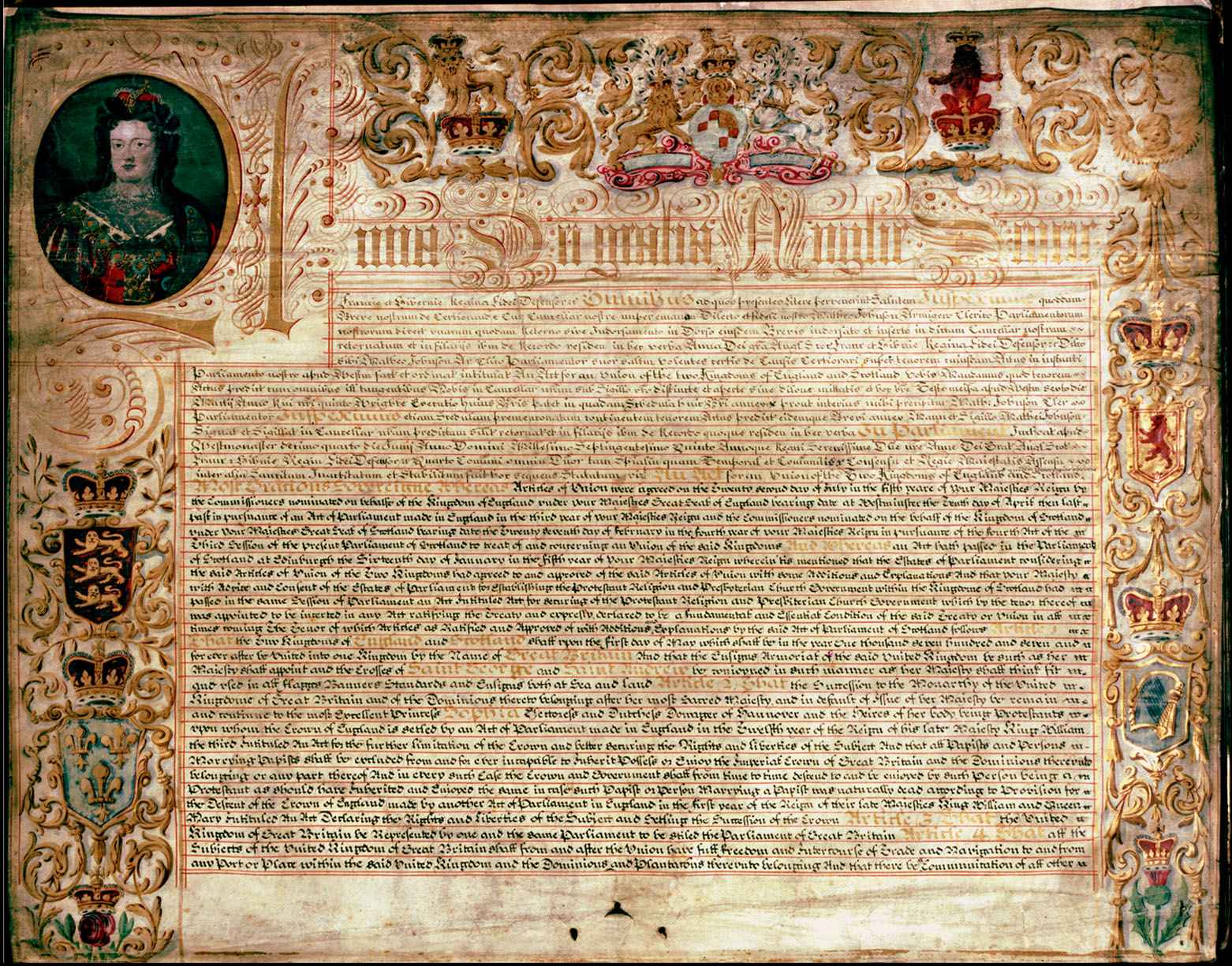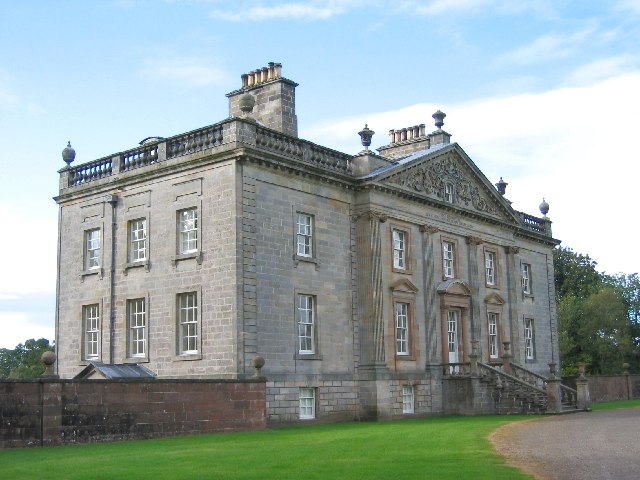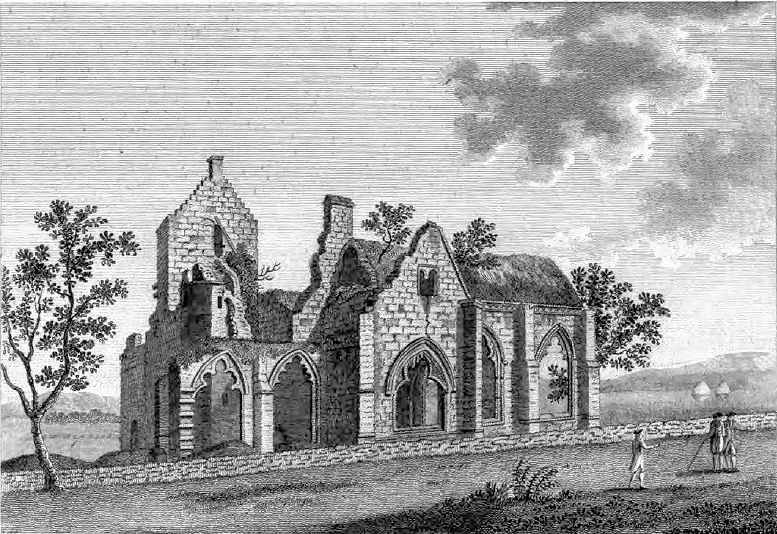|
1706 In Scotland
Events from the year 1706 in the Kingdom of Scotland. Incumbents * Monarch – Anne * Secretary of State – Hugh Campbell, 3rd Earl of Loudoun, jointly with John Erskine, 6th Earl of Mar Law officers * Lord Advocate – Sir James Stewart * Solicitor General for Scotland – William Carmichael Judiciary * Lord President of the Court of Session – Lord North Berwick * Lord Justice General – Lord Tarbat * Lord Justice Clerk – Lord Ormiston Events * April – commissioners assemble in London to agree a Treaty of Union between Scotland and England. * 22 July – Treaty of Union agreed in London. * c. September – Daniel Defoe is sent to Edinburgh as an English government agent to promote ratification of the Treaty of Union. * 3 October – opening of the Parliament of Scotland which will debate the Union. * 19 October – an Edinburgh mob opposed to the Union threatens the Lord Provost. * 4 November – the Parliament of Scotland votes in favour of the Union w ... [...More Info...] [...Related Items...] OR: [Wikipedia] [Google] [Baidu] |
Kingdom Of Scotland
The Kingdom of Scotland (; , ) was a sovereign state in northwest Europe traditionally said to have been founded in 843. Its territories expanded and shrank, but it came to occupy the northern third of the island of Great Britain, sharing a land border to the south with England. It suffered many invasions by the English, but under Robert the Bruce it fought a successful War of Independence and remained an independent state throughout the late Middle Ages. Following the annexation of the Hebrides and the Northern Isles from Norway in 1266 and 1472 respectively, and the final capture of the Royal Burgh of Berwick by England in 1482, the territory of the Kingdom of Scotland corresponded to that of modern-day Scotland, bounded by the North Sea to the east, the Atlantic Ocean to the north and west, and the North Channel and Irish Sea to the southwest. In 1603, James VI of Scotland became King of England, joining Scotland with England in a personal union. In 1707, during the reign ... [...More Info...] [...Related Items...] OR: [Wikipedia] [Google] [Baidu] |
Edinburgh
Edinburgh ( ; gd, Dùn Èideann ) is the capital city of Scotland and one of its 32 Council areas of Scotland, council areas. Historically part of the county of Midlothian (interchangeably Edinburghshire before 1921), it is located in Lothian on the southern shore of the Firth of Forth. Edinburgh is Scotland's List of towns and cities in Scotland by population, second-most populous city, after Glasgow, and the List of cities in the United Kingdom, seventh-most populous city in the United Kingdom. Recognised as the capital of Scotland since at least the 15th century, Edinburgh is the seat of the Scottish Government, the Scottish Parliament and the Courts of Scotland, highest courts in Scotland. The city's Holyrood Palace, Palace of Holyroodhouse is the official residence of the Monarchy of the United Kingdom, British monarchy in Scotland. The city has long been a centre of education, particularly in the fields of medicine, Scots law, Scottish law, literature, philosophy, the sc ... [...More Info...] [...Related Items...] OR: [Wikipedia] [Google] [Baidu] |
John Maule (MP)
John Maule (1706 – 2 July 1781), of Inverkeilor, Forfarshire, was a Scottish Whig politician who sat in the British House of Commons from 1739 to 1748. Maule was the second surviving son of Harry Maule, of Kellie, Forfar and his second wife Anne Lindsay, daughter of Patrick Lindsay of Kilbirnie, Ayrshire. His father was shire commissioner in the Parliament of Scotland. He was half brother to William Maule, 1st Earl Panmure. Maule was secretary to Lord Ilay, later Duke of Argyll, who was manager of elections in Scotland for Walpole and the Pelhams. In 1737 Maule was appointed Keeper of Register of Sasines. He was returned unopposed as Member of Parliament for Aberdeen Burghs at a by election on 8 June 1739 and supported the administration. He was elected again at the 1741 British general election but at the time of the second Jacobite rebellion of 1745 came under suspicion of being a Jacobite because of his ancestry. However he was classed as 'Old Whig' in 1746 and was ret ... [...More Info...] [...Related Items...] OR: [Wikipedia] [Google] [Baidu] |
1766 In Scotland
Events from the year 1766 in Scotland. Incumbents Law officers * Lord Advocate – Thomas Miller of Glenlee; then James Montgomery * Solicitor General for Scotland – James Montgomery; then Henry Dundas Judiciary * Lord President of the Court of Session – Lord Arniston, the younger * Lord Justice General – Duke of Queensberry * Lord Justice Clerk – Lord Minto, then Lord Barskimming Events * 1 January – Charles Edward Stuart ("Bonnie Prince Charlie", "the young Pretender") becomes the new Stuart claimant to the throne of Great Britain as King Charles III and figurehead for Jacobitism, on the death of his father James Francis Edward Stuart in Rome. * 17 April – James Craig's plan for the New Town, Edinburgh, wins the prize offered by the city council in January. * 13 June – two soldiers and a civilian found guilty in Aberdeen of theft during an earlier meal riot in Banff are rescued from custody by a mob. * 28 October – Coldstream Bridge across the ... [...More Info...] [...Related Items...] OR: [Wikipedia] [Google] [Baidu] |
Walter Goodall
Walter Goodall (1706? – 1766) was a Scottish historical writer, born in Banffshire, and educated at King's College, University of Aberdeen. Later he became assistant librarian to the Advocates' Library in Edinburgh. In 1754 Goodall published an ''Examination of the Letters said to have been written by Mary Queen of Scots'' on Casket letters. Printing the letters, he contested their authenticity. He also edited John of Fordun's ''Scotichronicon'' (1759). Life He was the eldest son of John Goodall, a farmer in Banffshire. He was educated at King's College, Old Aberdeen, which he entered in 1723, but left without taking a degree. In 1730 he obtained employment in the Advocates' Library, Edinburgh, and in 1735 became sub-librarian. Goodall died in poverty 28 July 1766. Works Walter Goodall aided the principal librarian Thomas Ruddiman in the compilation of the catalogue of the Advocates' Library, printed in 1742. In 1753 Goodall edited a new issue of the garbled ''Memoirs o ... [...More Info...] [...Related Items...] OR: [Wikipedia] [Google] [Baidu] |
1781 In Scotland
Events from the year 1781 in Scotland. Incumbents Law officers * Lord Advocate – Henry Dundas; * Solicitor General for Scotland – Alexander Murray Judiciary * Lord President of the Court of Session – Lord Arniston, the younger * Lord Justice General – The Viscount Stormont * Lord Justice Clerk – Lord Barskimming Events * Construction of The Mound in Edinburgh begins. * Montrose Lunatic Asylum, Infirmary & Dispensary, predecessor of Sunnyside Royal Hospital, founded by Susan Carnegie. * John Howie begins publication of the 2nd edition of his ''Biographia Scoticana (Scots Worthies): A Brief Historical Account of the Lives, Characters, and Memorable Transactions of the Most Eminent Scots Worthies''. Births * March (probable) – John Burnet, engraver and painter (died 1868) * 16 March – William Mitchell, entrepreneur (died 1854) * 19 March – John Henry Wishart, surgeon (died 1834) * 12 June (probable) – Christian Isobel Johnstone, journalist an ... [...More Info...] [...Related Items...] OR: [Wikipedia] [Google] [Baidu] |
James Abercrombie (British Army General)
General James Abercrombie or Abercromby (1706 – 23 April 1781) of Glassaugh, Banffshire was a British Army general and Whig politician who sat in the House of Commons from 1734 to 1754. He was commander-in-chief of forces in North America during the French and Indian War, best known for the disastrous British losses in the 1758 Battle of Carillon. Biography Abercrombie was born in Glassaugh, Banffshire, Scotland, the eldest son of Alexander Abercromby, also MP for Banffshire, and his wife Helen Meldrum. He was appointed an ensign in the 25th Regiment of Foot at age eleven. He married Mary Duff (sister of William Duff, 1st Earl Fife) and they had one daughter. At the 1734 British general election, he was returned by his brother-in-law, William Duff, later Lord Braco, as Member of Parliament for Banffshire. He voted regularly with the Government. Abercrombie was promoted to captain in 1736, and by 1739 was lieutenant-governor of Stirling castle. He was re-elected MP f ... [...More Info...] [...Related Items...] OR: [Wikipedia] [Google] [Baidu] |
1782 In Scotland
Events from the year 1782 in Scotland. Incumbents Law officers * Lord Advocate – Henry Dundas; * Solicitor General for Scotland – Alexander Murray Judiciary * Lord President of the Court of Session – Lord Arniston, the younger * Lord Justice General – The Viscount Stormont * Lord Justice Clerk – Lord Barskimming Events * 23 January – local Laird George Ludovic Houston invites purchase of marked plots of land which, when built upon, form the planned town of Johnstone, to provide employment for his thread and cotton mills, and one of the latter is erected by Corse, Burns & Co. * 1 July – Act of Proscription 1746 (including Dress Act) repealed, permitting wearing of Highland dress and arms. * Muslin first woven in Scotland by James Monteith at Anderston. Births * 2 February – James Chalmers, printer, publisher and bookseller, claimed inventor of the adhesive postage stamp (died 1853) * 17 March – Andrew Halliday, physician, reformer and write ... [...More Info...] [...Related Items...] OR: [Wikipedia] [Google] [Baidu] |
Alexander Boswell, Lord Auchinleck
Alexander Boswell, Lord Auchinleck, 8th Laird of Auchinleck (1706–1782) was a judge of the supreme courts of Scotland. He was the father of the author and biographer James Boswell, and grandfather of songwriter Alexander Boswell (songwriter), Sir Alexander Boswell. Alexander Boswell was the eldest son of James Boswell (ca. 1672–1749), 7th Laird of Auchinleck. He attended the University of Edinburgh, read Civil Law at the University of Leyden and was admitted to the Faculty of Advocates in 1727. He was appointed Sheriff of Wigtown in 1748 but resigned the position in 1750 after inheriting the Auchinleck estate in Ayrshire on the death of his father. There he built the present Adam-style Auchinleck House. In 1754 he built a new aisle in Auchinleck church for Rev John Dun who was also the family tutor.Fasti Ecclesiastae Scoticana vol.3 by Hew Scott Alexander was nominated to the Court of Session in 1754, receiving the additional appointment to the High Court of Justiciar ... [...More Info...] [...Related Items...] OR: [Wikipedia] [Google] [Baidu] |
Earl Of Ilay
Earl () is a rank of the nobility in the United Kingdom. The title originates in the Old English word ''eorl'', meaning "a man of noble birth or rank". The word is cognate with the Scandinavian form ''jarl'', and meant "chieftain", particularly a chieftain set to rule a territory in a king's stead. After the Norman Conquest, it became the equivalent of the continental count (in England in the earlier period, it was more akin to a duke; in Scotland, it assimilated the concept of mormaer). Alternative names for the rank equivalent to "earl" or "count" in the nobility structure are used in other countries, such as the ''hakushaku'' (伯爵) of the post-restoration Japanese Imperial era. In modern Britain, an earl is a member of the peerage, ranking below a marquess and above a viscount. A feminine form of ''earl'' never developed; instead, ''countess'' is used. Etymology The term ''earl'' has been compared to the name of the Heruli, and to runic ''erilaz''. Proto-Norse ''eri ... [...More Info...] [...Related Items...] OR: [Wikipedia] [Google] [Baidu] |
Archibald Campbell, 3rd Duke Of Argyll
Archibald is a masculine given name, composed of the Germanic elements '' erchan'' (with an original meaning of "genuine" or "precious") and ''bald'' meaning "bold". Medieval forms include Old High German and Anglo-Saxon . Erkanbald, bishop of Strasbourg (d. 991) was also rendered in Old French. There is also a secondary association of its first element with the Greek prefix '' archi-'' meaning "chief, master", to Norman England in the high medieval period. The form ''Archibald'' became particularly popular among Scottish nobility in the later medieval to early modern periods, whence usage as a surname is derived by the 18th century, found especially in Scotland and later Nova Scotia. Given name English diminutives or hypocorisms include '' Arch, Archy, Archie, and Baldie (nickname)''. Variants include French ''Archambault, Archaimbaud, Archenbaud, Archimbaud'', Italian '' Archimboldo, Arcimbaldo, Arcimboldo'', Portuguese '' Arquibaldo, Arquimbaldo'' and Spanish ''Archib ... [...More Info...] [...Related Items...] OR: [Wikipedia] [Google] [Baidu] |
Dumfries
Dumfries ( ; sco, Dumfries; from gd, Dùn Phris ) is a market town and former royal burgh within the Dumfries and Galloway council area of Scotland. It is located near the mouth of the River Nith into the Solway Firth about by road from the Anglo-Scottish border and just away from Cumbria by air. Dumfries is the county town of the historic county of Dumfriesshire. Before becoming King of Scots, Robert the Bruce killed his rival the Red Comyn at Greyfriars Kirk in the town on 10 February 1306. The Young Pretender had his headquarters here during a 3-day sojourn in Dumfries towards the end of 1745. During the Second World War, the bulk of the Norwegian Army during their years in exile in Britain consisted of a brigade in Dumfries. Dumfries is nicknamed ''Queen of the South''. This is also the name of the town's professional football club. People from Dumfries are known colloquially in Scots language as ''Doonhamers''. Toponymy There are a number of theories on the etymo ... [...More Info...] [...Related Items...] OR: [Wikipedia] [Google] [Baidu] |





